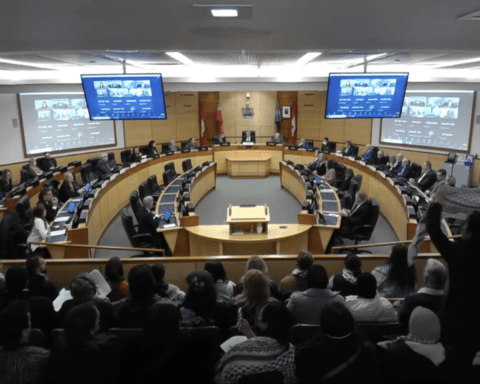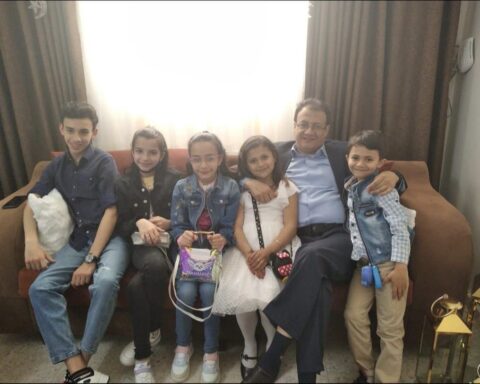Foreign Affairs Minister Stéphane Dion told the House of Commons Tuesday that Canada will follow calls from the United Nations to reverse its unilateral sanctions on Iran in the wake of the Iran nuclear deal.
“We will do it in a speedy fashion but we will do it effectively,” Dion told reporters in a scrum after referencing the move during question period. “I would say that the approach of the previous government was ideological and irrational.”
Conservatives still not on board
Over its nine years in power, the former Conservative government levelled sanctions on Iran, broke off diplomatic ties and listed the country as a state sponsor of terrorism.
Iran’s former president, Mahmoud Ahmadinehjad called for Israel to be wiped off the map during his tenure and the country has been accused of using its support for groups like Hamas and Hezbollah to wage a proxy conflict against Israeli interests and stability.
Former Prime Minister Stephen Harper branded himself as a staunch ally of Israel and his party’s now-opposition members continued that fight on Monday, criticizing the government for not condemning strongly enough tit-for-tat violence between Israelis and Palestinians.
Iran’s current president, Hassan Rouhani, has been billed as a relative moderate in terms of his approach to normalizing relations with the West.
“Iran continues to be a state sponsor of terrorism, it continues to deny the very existence of Israel.”
Last year he and international partners led by U.S. negotiators reached agreement on a nuclear accord aimed at limiting Iran’s nuclear capabilities in exchange for the gradual lifting of economic sanctions.
Independent investigators announced last week that they had verified Iranian compliance with the initial stage of the accord and as a result, the United States and other countries announced they would begin lifting sanctions on the Islamic Republic.
Despite that, Conservative foreign affairs critic Tony Clement criticized the government for its decision to lift sanctions.
“Iran continues to be a state sponsor of terrorism, it continues to deny the very existence of Israel,” he said. “Canada should act in concert with allies to go slow on this approach and to those who say, ‘well, we might miss a business opportunity or two,’ I have every confidence in Canadian business that they can find other places in the world to do business.”
Engaging Iran makes economic sense
Iran’s population of 80 million, many of whom are educated and seeking opportunities in business and high-tech industries, has many billing it as a veritable gold mine for businesses able to get an early toe in the door as its economy opens.
“[W]e’d be crazy not to move with the international community to reengage with [Iran] economically.”
Rouhani is currently in Europe, the first Iranian president to visit in more than 15 years, and the speculation is that he will sign or kickstart business deals while there.
“Since the Iranians appear to be complying with the terms of the nuclear agreement, we’d be crazy not to move with the international community to reengage with them economically,” said Dave Perry, senior analyst with the Canadian Global Affairs Institute.
The projected growth in Iran’s economy also has the potential to shift the dynamics in the Middle East as the Shiite country becomes more prominent and asserts itself as a counterweight to its rival, Sunni Saudi Arabia.
Iran’s elite Quds force is already operating in Iraq as part of the fight against ISIS militants and Defence Minister Harjit Sajjan said it’s crucial that Canada be able to engage with all parties as part of its fight to eliminate the group.
“We need to take a much broader view of the world,” Sajjan said. “We need all countries to take part in making sure that we start looking at conflict and trying to stabilize certain areas. If we do not have a voice with other nations, we’re not going to be able to have those difficult discussions and resolutions in the places where we keep sending our men and women into harms way for.”
No clear timelines in place yet
Dion says the Conservative party’s suggestions that Canada maintain the former government’s policies on freezing out Iran even as allies drop sanctions and engage with the country would put Canada out of sync with the rest of the world, saying that Canada needs to be “back at the table where Iran is.”
It’s not clear when the sanctions will be lifted or specifically which ones could remain in place.
It’s not clear when the sanctions will be lifted or specifically which ones could remain in place.
The nuclear accord outlines a gradual lifting of sanctions and each stage of progression will see more and more of the sanctions lifted — while non-compliance with the accord will see them slapped back in place.
The Liberal government has touted a renewed focus on diplomacy as a cornerstone of its foreign policy, with Prime Minister Justin Trudeau and ministers trying to shape the idea that “Canada is back.”
“We think that when you have a disagreement with the regime, you don’t pull out – you work harder to see that there will be improvement,” Dion said.
In that vein, Trudeau promised during the 2015 campaign to restore diplomatic relations with Iran and re-open Canada’s embassy in Tehran if elected.
Dion did not comment on when Canada will re-open its embassy.
Re-published in partnership with iPolitics.ca.




